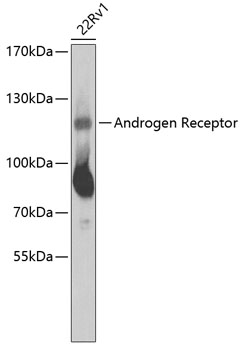Product Detail
Product NameAR Antibody
Host SpeciesRabbit
ClonalityPolyclonal
IsotypeIgG
PurificationAffinity purification
ApplicationsWB
Species ReactivityHuman,Mouse
SpecificityThe antibody detects endogenous level of total AR protein.
Immunogen TypePeptide
Immunogen DescA synthetic peptide of human Androgen Receptor (NP_000035.2).
Target NameAR
ConjugateUnconjugated
Other NamesAIS;AR8;DHTR;HUMARA;HYSP1;KD;NR3C4;SBMA;SMAX1;TFM;AR
Accession NoUniprot:P10275
GeneID:367
Uniprot
P10275
Gene ID
367
Sdspage MW110kDa
Concentration1.0mg/ml
FormulationPBS with 0.02% sodium azide,50% glycerol,pH7.3.
StorageStore at -20˚C. Avoid freeze / thaw cycles.
Application Details
WB 1:500 - 1:2000
Western blot analysis of extracts of 22RV1 cells, using Androgen Receptor Antibody.
The androgen receptor gene is more than 90 kb long and codes for a protein that has 3 major functional domains: the N-terminal domain, DNA-binding domain, and androgen-binding domain. The protein functions as a steroid-hormone activated transcription factor. Upon binding the hormone ligand, the receptor dissociates from accessory proteins, translocates into the nucleus, dimerizes, and then stimulates transcription of androgen responsive genes. This gene contains 2 polymorphic trinucleotide repeat segments that encode polyglutamine and polyglycine tracts in the N-terminal transactivation domain of its protein. Expansion of the polyglutamine tract from the normal 9-34 repeats to the pathogenic 38-62 repeats causes spinal bulbar muscular atrophy (Kennedy disease). Mutations in this gene are also associated with complete androgen insensitivity (CAIS). Two alternatively spliced variants encoding distinct isoforms have been described.
If you have published an article using product 32572, please notify us so that we can cite your literature.
et al,Androgen receptor-induced molecules and androgen contribute synergistically to male-predominance of hepatocellular carcinoma. In iScience on 2024 Jul 15 by Jiayi Zhao, Letian Fang,et al..PMID:39156638
, (2024),
PMID:
39156638



 Yes
Yes



